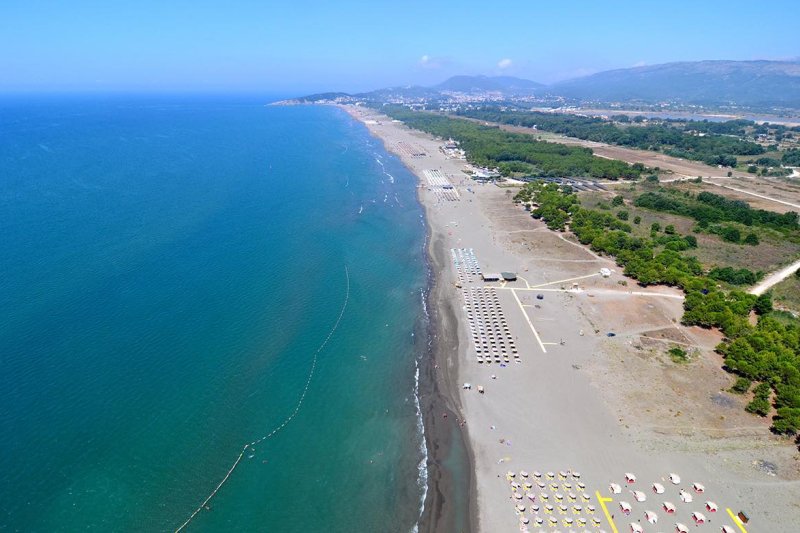The Battle for Ulcinj’s Soul
For centuries, Ulcinj has stood as a bastion of Albanian identity — a city that has withstood empires, survived wars, welcomed the displaced, and protected its people from suffering and erasure. From the ancient walls of the Castle to the golden coastline of Plazhi i Madh, Ulcinj has never simply been a place. It has been memory. It has been meaning. It has been home.
But today, Ulcinj finds itself under siege once again — not by invading armies or political collapse, but by quietly signed agreements. By power exercised without transparency. This is not merely a local issue or a regional project. It is a test. A test of democracy. A test of respect. A test of whether the histories and rights of small communities can be disregarded in the face of foreign capital.
On March 28, 2025, the Government of Montenegro signed a long-term lease agreement with the United Arab Emirates, granting control over Velika Plaza, the Bojana River Delta, and potentially the Ulcinj Salina for a period of 99 years — nearly a century. This agreement was signed without public consultation, without competitive tendering, and without any environmental review. The citizens of Ulcinj — over 75% of whom are of Albanian origin — were not informed, let alone invited to participate in decision-making about the future of their land.
We must not forget: it was the Albanians of Montenegro who, with open minds and open hearts, cast the decisive votes that secured independence — not as outsiders, but as native residents, as equal participants in a shared future. We supported a sovereign Montenegro in the belief that we would help build a country where every voice matters, where diversity is valued, and where no citizen is left behind. As the former Executive Director of the Albanian-American Association of Ulcinj, I did my part to honor that belief — co-organizing the celebration of Montenegro’s Independence Day at New York City Hall, not only to honor the nation’s statehood but to emphasize the role that Albanians and all minorities have played in building it.
But when decisions of this magnitude are made behind closed doors — without our knowledge, without our consent — it signals that our trust has been misused. That our voice is conditional. That our role in building the country ends the moment someone else decides our land is for sale.
What the government calls “valorization” is, in reality, the commercialization of culture, the gradual silencing of civic voice, and the dismantling of an ecosystem that for generations has been held sacred. This is not development — it is displacement. This is not progress — it is erasure.
Ulcinj has long coexisted across time — Albanians, Montenegrins, neighbors and friends — bound not by perfect harmony but by shared history and a deep connection to this land. The coastal area at the center of this agreement — Plazhi i Madh, the Bojana Delta, the Ulcinj Salina — is not only of economic importance. It is an internationally protected ecological zone, rich with rare species, migratory birds, sand dune habitats, and wetlands that help mitigate the effects of climate change. This region is critical not only to the environment, but also to the cultural continuity and economic sovereignty of our city.
Every summer, our diaspora returns — from Kosovo, Albania, Australia, Germany, Switzerland, the United States — not as tourists, but as family. You fill the streets, the cafes, the beaches; you invest, build, support the local economy, and keep the spirit of Ulcinj alive, year after year. Your presence is not a burden — it is a lifeline for this city. You are not outsiders — you are the extended heartbeat of Ulcinj. And yet, your voice — like that of the entire community — was excluded.
My family has lived in Ulcinj for over eleven generations. This is not folklore — it is living truth. And like many others, I want my daughter to walk this land with pride, knowing it still belongs to her people. But piece by piece, this land is being handed over to private developers — in silence, in the name of “development” — while those who have protected it for centuries are offered nothing more than temporary jobs, low wages, and no real voice in decision-making.
This is not a strategy for sustainable development. It is a path to exclusion. Brothers and sisters in the diaspora: you have carried Ulcinj in your hearts and your work for decades. Now is the time to defend it.
Write to your elected representatives. Speak with community leaders. Share this message. Sign the petition: change.org/p/stop-devastaciji-velika-plaža-za-budu?e-generacije-ne-za-privatne-interese
This is not just a question of Ulcinj. It is a test of how decisions are made, who benefits from them, and whether we are willing to stand when the things we love most are at risk.
Robert F. Kennedy once said: “Each time a man stands up for an ideal, or acts to improve the lot of others… he sends forth a tiny ripple of hope, and crossing each other from a million different centers of energy and daring, those ripples build a current which can sweep down the mightiest walls of oppression and resistance.”
Let Ulcinj be that ripple. Let this moment be our current. We must be clear:
No to silence.
No to betrayal.
No to selling what was never yours to sell.
Ulcinj is not for sale. Not for 99 years. Not ever. / ADN
*The author is a representative of the Albanian-American Diaspora of Ulcinj; activist for Albanian American Diaspora of Montenegro













